Representation and Ability On Stage in Dallas, Texas
Every artist brings a set of challenges with them into the rehearsal room.
I met Sherry Jo Ward, a theatre administrator and actor, when I was a graduate student at Baylor University in 2008; she taught courses and worked with me in the box office. She was always patient and enthusiastic with patrons, even the ones who fatigued us.
In 2015, she was diagnosed with Stiff Person Syndrome (SPS), a neurological chronic illness that affects a person’s mobility, muscular functions, and speech. With SPS, ordinary activities like walking are significantly curtailed and sufferers may experience unpredictable muscle spasms that immobilize them for prolonged periods of time. It is a one-in-a-million diagnosis for which there is no known cure. Sherry Jo now navigates through life a bit more slowly but with a rad decked-out walker.
In 2017, Sherry Jo created a one-person autobiographical play, STIFF, and chose Marianne T. Galloway to direct. Marianne, who happens to be Deaf, has been directing and performing plays and musicals at regional theatres in Dallas since 2002.
I reached out to Sherry Jo and Marianne to discuss their thoughts on representation in Dallas/Fort Worth theatre and how they press forward, artistically, despite their challenges.
Shelby-Allison Hibbs: Both of you have very different stories regarding your experiences with physical challenges. Sherry Jo, your challenge emerged later in life. How did you discover your chronic illness and what impact has it had on your career?
Sherry Jo Ward: I thought I had planned my life out strategically. Being married to an actor [and knowing I wanted to have kids], I got my MFA in theatre management so I could get a nine-to-five job. I wanted to have that stability. I thought, “Once I get to my forties, when [my kids are not] babies anymore, I will get back to acting.” I felt like that would be when I’d be most “castable” anyway. I basically took a ten-year hiatus from acting.
When we moved to Dallas/Fort Worth in 2014, I was feeling, Something is just not right. I got an MRI, and everyone kept saying, “We can’t find anything.” But after the MRI, the feeling got worse; it was like a big sudden change in my physical abilities.
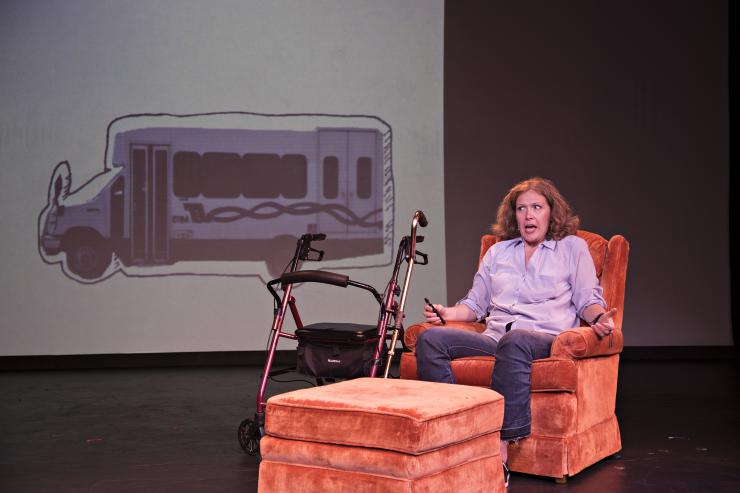
Shelby-Allison: You returned to acting in 2015, and received the SPS diagnosis during your production of International Falls that winter, right?
Sherry Jo: I was set to start rehearsals at Stage West and the producer, Dana [Schultes], contacted me and said, “Should we postpone this?”
I was like, “Well… No. Because, I just got the diagnosis. And it’s not going to get better. So, let’s do it now.”
Fortunately, I was doing a show that Thomas Ward [my husband] wrote for us to do, where I was acting with him. Most of the set was a bed, so we made accommodations as needed. We didn’t change anything; my limited mobility was just a part of the character.
Then it was audition season, when I planned to be auditioning for a bunch of stuff, and I thought not just that it would be hard to cast me, but it would be hard for me to give a role what it needs, as far as time and energy and stamina and all that.
Shelby-Allison: Marianne, I’ve read and have been told different things about your hearing loss. Do you identify as “Deaf” or is it “extreme hearing loss”? What’s the correct terminology?
Marianne Galloway: It depends on who you ask. I identify as Deaf, but the Deaf community sees me as “deaf” with a lowercase “d” because I don’t sign exclusively at home.
I function in the hearing society. I “pass” as hearing. But what I have, scientifically, is a “severe bilateral sensorineural hearing impairment.” It means I can’t hear anything except vowels. I can’t hear consonants. I have hearing aids that do a lot of heavy lifting for me. Without them I don’t know what’s going on.
I don’t know if I was born with it or if it came on when I was young. But I do not have memories of living without hearing loss.
Shelby-Allison: Did you encounter difficulty entering into theatre since it has such a focus on verbal speech?
Marianne: I think I’ve been acting like I could hear my entire life. I did not learn sign language as a child because my parents wanted me to function in a hearing society. So, I was put in rigorous speech therapy, and I can read lips like an Olympic swimmer.
Because I don’t like being told there are things I cannot do, I decided in high school that I was going to be an opera singer. I started taking voice lessons and started navigating how things felt as opposed to how they would be heard.
I didn’t have any legitimate training in theatre. I didn’t know anybody. So, I started a theatre company called Risk Theatre Initiative.
‘I identify as Deaf, but the Deaf community sees me as ‘deaf’ with a lowercase ‘d’ because I don’t sign exclusively at home. I function in the hearing society. I ‘pass’ as hearing.’—Marianne T. Galloway
Shelby-Allison: You started it to give yourself opportunities when companies in Dallas wouldn’t cast you at auditions.
Marianne: I met some other people who were in the same boat.
Shelby-Allison: With Risk, you moved more towards directing, something you did in college. How did that shift happen while you were starting this new theatre company? If you wanted to act, why didn’t you pursue that initially?
Marianne: I felt like I could direct more than I could act because I was in control of the environment. If I could control the environment, then I could set things up so I could be successful.
The amount of work I would have to do to compensate for the hearing loss—I was doing it and not even telling people that I was Deaf. Once I worked past being open about my disability, working in theatre got a lot easier.
Shelby-Allison: You’ve also taken your directing work into musicals, which at face value seems incompatible. But you’re able to identify pitch, and, if you’re hearing mostly vowels, are you able to catch rhythm as well?
Marianne: Rhythm I feel. Generally speaking, music is something you feel. Even somebody with typical hearing, they’re not going to hear what they sound like. So, everybody is adjusting for something. I just have to make a different set of adjustments than a typical hearing person would.
As far as directing goes, I have an assistant director (Micah Lyles) who has been working with me for fifteen years. He can just read me. He knows when I need him to go out into the house and be my ears.
When a sound designer asks, “What does this feel like?” I’ll be like, “It feels fine.” I have to look at Micah and say, “Is this emotionally doing what it’s supposed to be doing here?” Without that person there, it can be a crapshoot.
Shelby-Allison: Marianne, before I met you, I saw a comment you posted in the D-FW Theatre Facebook Group in a heated thread about representation. You called out a theatre company for a production of Silent Sky by Lauren Gunderson, a play in which the lead character, who is based on a historical figure, faces hearing loss. You noted that this production did not acknowledge that a person with real hearing loss was a part of the cast. At the time, I didn’t realize that you were referring to yourself, as you had portrayed Annie Cannon, another character based on a historical figure.
What bothered you about the approach towards representation of people with unique physical challenges or other life experiences in that production?
Sherry Jo: What I remember most as an audience member is that in the post-show discussions, the hearing actress who played the deaf character was the one who was representing deaf people and answering audience questions about being deaf. And that seemed so strange.
Marianne: It was strange. And it was problematic.
I think that, in terms of representation, if you have somebody available who walks a certain road in life and deals with certain issues, not reaching out to them and incorporating them in a discussion of what that is like is such a loss. And you lose the opportunity for a deeper resonance not just in a production but in a character, and ultimately in the lives that we touch with the art we present.
I think it’s a learning process. There were talkbacks with children and students in the audience who were asking the lead actress, “So what was it like playing a deaf character?” In her answers she would say, “Well, A, B, C, and D.”
However, as the Deaf person sitting onstage with her during the talkback, I was put in the position to say “I’m actually deaf and what she’s saying isn’t inaccurate… However, also: E, F, G, H.”
When it hasn’t been set up so that the person with the challenge is given a voice, then that person is put in the position of having to speak when it may not be welcome. And that’s unfortunate.
I knew when I said something online that I was about to piss off some people, and I didn’t care.
Sherry Jo: Because it needed to be said.
Marianne: And it also went back to the playwright, Lauren Gunderson. The character I played, Annie Cannon, was a real person. A real person who also happened to be hearing impaired. The character Annie Cannon is not. So the reality for that woman was manipulated for theatrical purposes.
When you haven’t looped in the person who actually walks on that road into the conversation, it turns into something that it didn’t have to be. With that said, it was never the director’s intention to do that.
Shelby-Allison: Isn’t that a difficult conversation to have? I mean, negotiating what each individual is comfortable with when discussing a role in a production? You don’t want to offend by saying something incorrect during the conversation, but you also don’t want to offend by making assumptions either.
Marianne: It is. It’s really hard to start that conversation. Because it starts to run into what you are allowed to ask in a rehearsal room. Like, legally. There are things you are not allowed to discriminate against—age, gender, race, or disability. But, we are in a field that looks at age, gender, etc. And we talk about those things. It comes down to us to be open to talk about it.
“Assume people are doing their best. There are so many times it’s like, ‘I’ve given you no reason to think I’m slacking off. So let’s just assume that I’m doing my best.’”— Sherry Jo Ward
Shelby-Allison: Have you ever felt pressure to pretend that your challenge doesn’t exist, particularly with your theatre work?
Sherry Jo: I haven’t. And this is one of the things that comes up a lot in post-show discussions. I have a very visible disability. I always have people come up to me saying, “This resonated with me because I have fibromyalgia, rheumatoid arthritis, Crohn’s disease.”
My boss at Dallas Children’s Theater came to see STIFF and said, “I can’t believe you were dealing with this while you were working.” But what do you say to them without feeling like you’re whining?
Shelby-Allison: Since your diagnosis, you have continued to work at regional theatres. Are you coming to roles through a different avenue now or the same audition process?
Sherry Jo: The last couple of shows I have been in, other than STIFF, have been incidents where the director has called me and said: “I think you can do this role. I think this wouldn’t be too hard for you. Come to callbacks.”
They know there is going to be some element of: “We’re going to have to adjust for this or make accommodations for that.” And they do. It feels so good that I can go in and there will be extra efforts to make sure I can do a show comfortably.
Marianne: It makes it so much more interesting to have options for “differently abled” people. I don’t know if that’s the right terminology, there are so many different politically correct terms for things.
When I did a production of Children of a Lesser God, I had to do that production without my hearing aids on. Which was terrifying.
Sherry Jo: Really?
Marianne: Yeah. The characters talk about how my character has zero hearing, so she cannot wear hearing aids, and there are other characters in the play who do wear hearing aids.
So, I’d take them out for rehearsal [of Children] and say, “Ok, Marianne’s going offline!” There was an interpreter at every rehearsal, and I speak ASL. But I have been in [other] situations where I have missed call times that the stage manager is giving and I am looked at as being a diva or—
Sherry Jo: Irresponsible.
Marianne: Right, because it’s like, “Well she seems hearing. She’s just blaming it on her hearing impairment.”
It doesn’t take much effort to take things into consideration or have an interpreter at a rehearsal.
Shelby-Allison: Everyone has a set of challenges when they enter the rehearsal room.
Marianne: And a lot of times they’re invisible. Even when someone’s dog dies, they are coming in with a challenge. One of the things that Sherry talks about in STIFF is looking at the person sitting next to you and realizing that you have no idea what’s going on inside their body. And it’s not just their body: it’s their mind, their emotions.
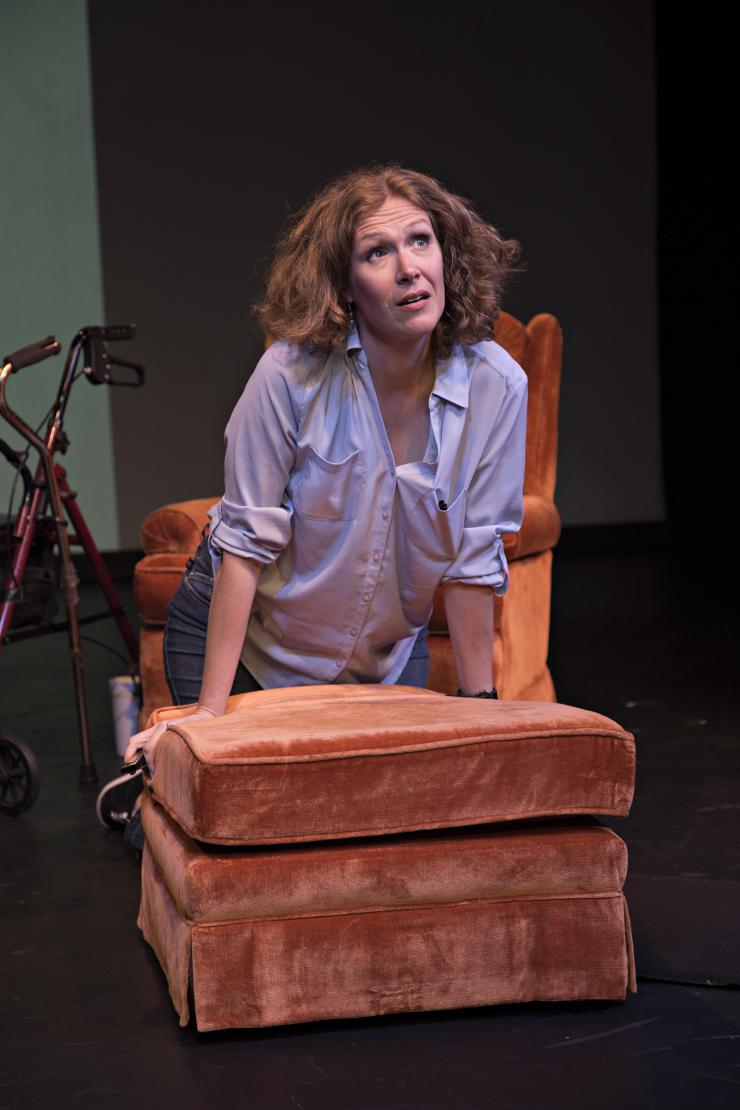
Sherry Jo: Have compassion. Just assume people are doing their best. There are so many times it’s like, “I’ve given you no reason to think I’m slacking off. So let’s just assume that I’m doing my best.”
Shelby-Allison: Since you perform STIFF yourself, what did you build into the play to ensure that your physical challenge would work with the performance? I saw that there are spots where you call for line.
Sherry Jo: The whole “safe word” thing is real. Marianne’s following along on book because there are a lot of times where I forget things and I constantly check in with her just to see, “Am I in the right place?”
Yes, it’s part of the show—and an important part of the show—but it also truly is a “safe word.”
Shelby-Allison: Can you speak about the current tour of STIFF? I saw a photo of you performing it at a hospital.
Sherry Jo: We had a very successful performance for the University of Texas Southwestern Medical Center in Dallas. We did it in a lecture hall filled with neurologists and neurology students. In the show I talk about my disdain for neurologists and they dug it! I was just like, “This was my experience.” And so, afterwards, there was an opportunity to say, “Here are some things that my doctors have asked that have been helpful.” I told them, “There was a relief in having a name put on what was going on because then I didn’t have to pretend I felt good anymore.”
Shelby-Allison: How has creating and touring STIFF changed you?
Sherry Jo: It’s become my life’s work. It’s given me a real sense of purpose and has been a cathartic experience. When I started it, I thought, I’m not going to write it if it can’t be a comedy. I find this thing about myself totally ridiculous. And it’s okay if you do too. Because it is ridiculous.
So far, every place we’ve done the show, we’ve included a post-show talkback where people can ask questions. I think that most talkbacks last longer than the hour-long show. There’s a part of me that’s like, “Dude, I don’t stay up past 10 p.m. I’m so medicated right now.” But that’s why I’m here.

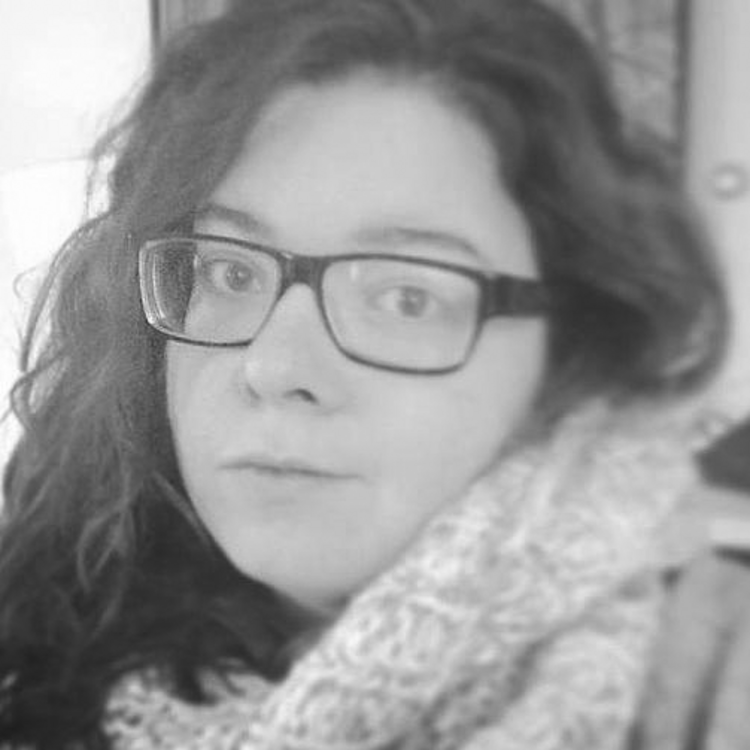
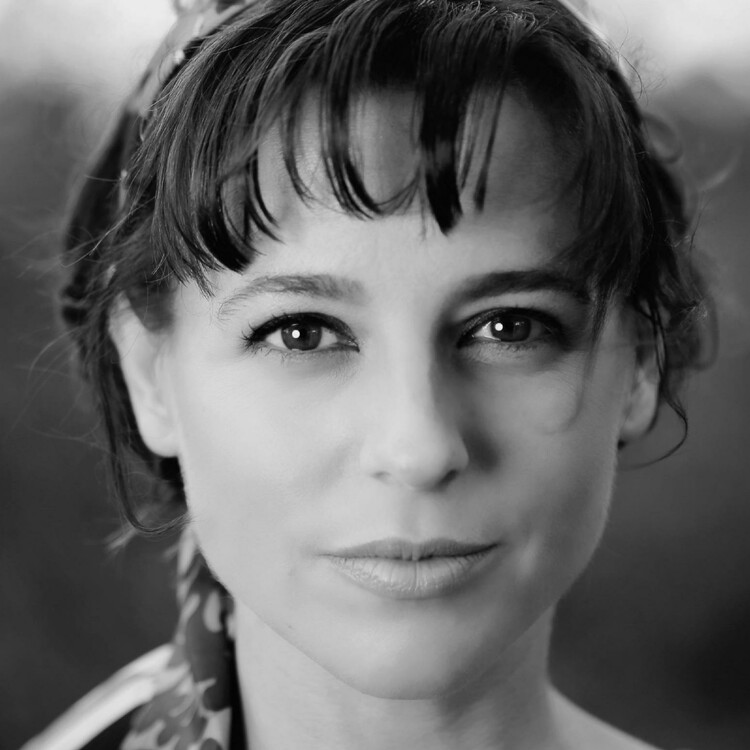
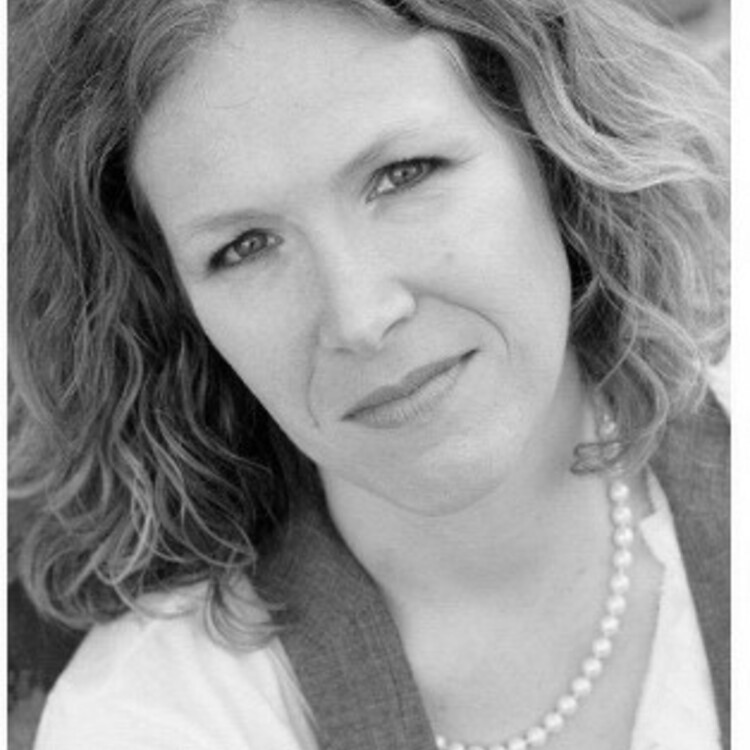
Comments
The article is just the start of the conversation—we want to know what you think about this subject, too! HowlRound is a space for knowledge-sharing, and we welcome spirited, thoughtful, and on-topic dialogue. Find our full comments policy here